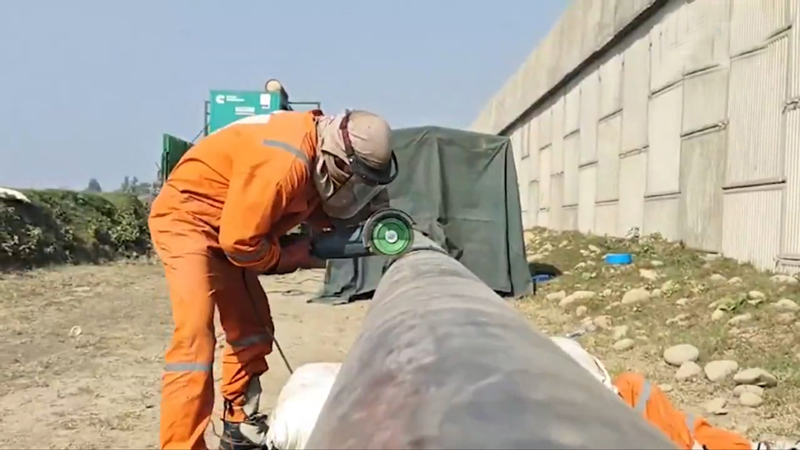“Aiming to enhance daily living for ordinary citizens”: Dr. Jitendra
By Avtar Bhat
JAMMU, Dec 5: The long-anticipated construction of the 175-kilometer Gurdaspur-Jammu Tawi Natural Gas Pipeline has commenced. This initiative is projected to provide domestic gas to households in Jammu by 2026.
Follow the Daily Excelsior channel on WhatsApp
Union Minister Dr. Jitendra Singh provided an update on this development via a post on X, stating, “The 175 km Gurdaspur-Jammu Tawi natural gas pipeline project is underway and is expected to supply domestic gas to homes by 2026. The Gas Authority of India (GAIL) is laying the pipeline adjacent to the Delhi-Katra Expressway, with initial work concentrated on sectionalizing valves in Kathua and Hiranagar.”
In a discussion with Excelsior, Dr. Singh labeled the initiative a game changer introduced by the Modi Government, stating that it aims to ease the lives of everyday citizens. He further noted that once operational, residents will no longer need to carry gas cylinders on their shoulders.
Kathua’s District Development Commissioner, Rakesh Minhas, confirmed that construction has commenced and expressed optimism that gas supply to Jammu will follow soon. He acknowledged that the UT Government has provided the necessary state land to GAIL, while GAIL is responsible for acquiring private land.
GAIL is tasked with laying the pipeline along the Delhi-Amritsar-Katra Expressway, with early work already in progress on sectionalized valves in both Kathua and Hiranagar.
Officials highlighted that this significant pipeline project includes developing essential infrastructure, such as pipe laying, station establishment, and distribution network creation. As a cleaner fossil fuel compared to coal and oil, natural gas is expected to lower greenhouse gas emissions and enhance air quality, contributing positively to both the environment and public health. The project aims to ensure a continuous gas supply throughout the year, regardless of weather or road conditions.
The proposed route for the main pipeline stretches from Gurdaspur-Pathankot in Punjab to Kathua-Samba and Jammu City in Jammu and Kashmir, with Gurdaspur being the starting point and Jammu City as the endpoint. The pipeline is designed to transport up to two million cubic meters of gas per day.
Officials remarked that the Gurdaspur-Jammu pipeline is set to play a crucial role in satisfying the natural gas needs of Jammu and Kashmir. Once operational, it will deliver environmentally-friendly fuel to Jammu and, ultimately, to the Kashmir Valley, thereby enhancing regional energy security.
In addition, the Petroleum and Natural Gas Regulatory Board (PNGRB) is working on developing a gas pipeline from Jammu to Srinagar. This decision follows the awarding of the 175-kilometer Gurdaspur-Jammu Tawi Gas Pipeline Project to GAIL. The pipeline will start from the Gurdaspur-Jammu Natural Gas Pipeline, with a possible extension to Srinagar by another vendor, as noted by officials.
Both pipeline projects aim to strengthen the energy security of the region by facilitating the transport of natural gas from Gurdaspur in Punjab to Jammu and Kashmir. This construction encompasses vital infrastructure, including pipe laying, installation of pumping stations, and the establishment of distribution networks.
Natural gas, being a cleaner alternative to coal and oil, is instrumental in reducing greenhouse gas emissions and improving air quality, bringing about favorable environmental and public health outcomes. These efforts will ensure a consistent gas supply year-round, irrespective of climatic conditions or road accessibility. The Government continues to introduce various initiatives to provide cleaner cooking and heating fuel options, including upgrading the electricity distribution system and now implementing the gas pipeline.
While it may take some years for the pipeline to fully service the Kashmir region, rail connectivity is projected to enhance by early next year, providing a crucial alternative for transporting gas to that division.
The introduction of natural gas via this pipeline also diversifies the energy resources available to the region, reducing dependence on conventional energy sources and enhancing resilience against supply disruptions. By promoting natural gas consumption, the project plays a vital role in the expansion of the natural gas market within Punjab and Jammu and Kashmir.
This initiative opens avenues for gas-based industries, stimulates investment, and fosters market competition, culminating in a more efficient and dynamic energy market. The introduction of modern gas heating infrastructure in Kashmir could soon become a major advancement akin to international standards.
Such initiatives promise to bolster tourism while decreasing reliance on traditional fossil fuels such as wood, coal, and diesel for heating applications. This transformative approach not only yields commercial benefits but also supports environmental sustainability in alignment with the commitments of the Paris Agreement to reduce carbon emissions significantly.
The Government remains committed to developing innovative solutions to provide advanced amenities for the residents of Jammu and Kashmir. This significant project offers a reliable and cleaner energy source to meet the growing energy demands of both regions, which in turn will benefit industries, businesses, and households. Utilizing natural gas is likely to generate employment opportunities, boost productivity, and result in enhanced living standards. Overall, the Gurdaspur-Jammu-Srinagar Gas Pipeline is a pivotal infrastructure project with far-reaching benefits, underpinning energy security, fostering economic development, promoting environmental sustainability, and facilitating regional integration.


Leave a Reply